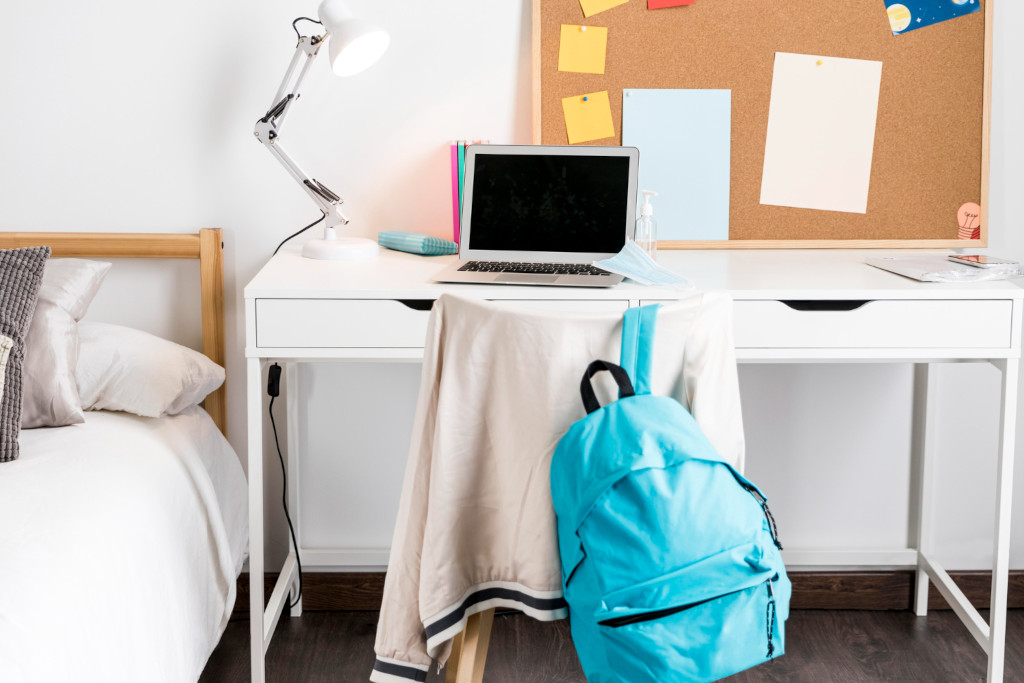SingaporeMotherhood | Parenting
February 2024
Tweak Routines for Positive Parenting + Homework Done without a Fight!

“I need to sit with my boys daily, otherwise they won’t do their homework. Is there a way to get them to complete their work independently without me?” A common issue many parents face is their kids’ preference for screentime over completing their homework upon reaching home. That could continue for hours till a caregiver’s nagging escalates to scolding — all negative routines.
The alternative of sitting with the child, supervising their homework, was precisely what I did. Well, that was until my enthusiasm wore off within two months. What started with positivity turned into something I dreaded because I kept thinking of all the other chores I still needed to do. My temper would flare and over time, my relationship with the kids was strained over studies.
Instead of unwittingly positioning myself as the stern disciplinarian, I decided to return the responsibility of homework back to them. So I tweaked their routines to encourage positive behaviours. After all, if we look closely, we all already have routines in place. The question is whether these repeated habitual actions serve us well — or not.
(See also: “HOW DO YOU MOTIVATE YOUR CHILD? IT’S PSLE NEXT YEAR AND MINE DOESN’T SEEM TO CARE!”)
Positive Home Routines on Show
Once, I had a guest over when three of my kids came home after school in turn. After greeting my friend, they each went to shower and promptly began doing their homework. The youngest, at six years old, quietly started on his own lunch.
“Wow, so automatic — you don’t need to tell them what to do at all!” my friend gushed.
She was witnessing the joys of positive parenting from having healthy structures in place. Once a routine is established, they run like clockwork, with or without mum present!
Furthermore, the earlier we start positive routines or replace unwanted behaviours, the better our relationship with our kids. No more nagging reminders about when to do what. No angry outburst because they’re staring at their screens for too long. There is no rush for me to even be home to supervise them.
Their habit is to complete their homework because after that, they get to do whatever they want (except for screentime). Nap, read, Legos, slime, playtime with neighbours…. The faster they complete their homework (with reasonable effort), the more time they have for themselves before dinner (another routine).

5 Steps to Tweak Existing Home Routines to Support Your Goals
Step 1: Observe Their Current Routine
What are the first three things your child does when they get home (after putting down their bags)? Note the pattern. Is it screentime during lunch, playing with slime, or getting a glass of water? Spend at least two days taking note or having your helper tell you exactly what they do in sequence.
This step is critical because you want to replace just ONE behaviour (from the entire sequence). A complete overhaul would be ideal, but I know from experience that unless there is a consistent authority figure to supervise multiple changes, a single tweak is more manageable.
Step 2: Pick One Habit to Replace
Of the three to five routine actions, decide which one you want to replace. And what is the new specific behaviour you want to replace it with?
For example, say your child checks their phone over lunch that ends up dragging on for an hour or more, then showers only because you reminded her to. Then screentime is the activity you want to target. Or if your child comes home, showers, and then lazes in their room, lazing may be the cornerstone habit to shift.
What are a few constructive things you’d rather your child do instead of the unwanted behaviour? Complete their homework? Sudoku puzzles (on paper) during lunch? Connect with someone over how they’re feeling at the moment?
Depending on your priority, decide on a timed activity that will replace the old habit. This requires setting an alarm for duration you agree upon together. Such as lunch for 20 minutes, then shower. Or homework for 30 minutes, then a 5-minute break. Even an hour-long nap for the younger ones is great because physical exhaustion commonly leads to tantrums (even though most kids never admit they are tired)!
(See also: TODDLER TANTRUM TRIGGERS (AND STRATEGIES TO SOLVE THEM!))
Step 3: Incentivise Them
No one likes changes and no one does it willingly, unless there’s something in it for them. You’ll need their buy-in and that happens through conversation.
But prior to initiating that conversation, brainstorm a list of what your child likes. Some good examples — and their benefits — include:
- A stick of ice cream/snack – why not enjoy life’s simple pleasures?
- 15 minutes of screentime – direct reward (set an alarm!)
- Their favourite dish over dinner – autonomy of choice
- 10 minutes of massage from mum – physical touch releases oxytocin
- Playing a card/board game with mum – bonding while having fun
- Peace that comes from mum not nagging them to complete their homework – plus an entire mood shift at home!
- Going downstairs to cycle or play with their friends/mum – exercise releases endorphins
- Helping to cook dinner – kids want to get involved!
Of course, ‘mum’ could also be dad, or even a favourite aunt. More importantly, never make money an incentive. Notice that my list includes different healthy activities as alternatives to screentime because the premeditated goal is to engage them meaningfully without digital devices.

Step 4: Celebrate Their Efforts
Be generous with your acknowledgements and celebrate their achievements — daily. It is imperative that you/someone is present to notice their changed behaviour and make a big deal about it immediately. Let your child know that their effort is being recognised. For the first two weeks, at least, continually encourage them by sowing seeds of positivity.
Treat it as though this is the only shot you have at effecting change. Because not many kids will be keen to try again if the success of their first experience is not anchored in. Keeping this in mind, watch out for your negative automatics and use this as an opportunity to change them too!
If they fail to do the new action for one day, don’t belittle, force, or threaten them. Instead, gently probe for a reason. Do they want to add something else to the reward list? Or are they troubled by something and just need to get that off their chest? Perhaps you stopped showing your appreciation and they’re trying to get your attention (albeit the negative way).
Demanding your child sticks to the new routine is a sure way to kill the initial small spark. Never douse the new habit with criticism or negativity. Positivity fans a huge flame that can sustain itself over time.
When all else fails, I use these hacks:
“Let’s do it together?” The greatest encouragement is when kids know they’re not alone and that their parents are tweaking a routine of their own. Nothing beats the fact that this is ‘our special thing’.
“What is one thing you want mum to start doing more or less of?” I love parenting by example. Doing things together not only connects parent and child deeply, but also raises the bar for me to grow as a parent, even while I forward my child’s personal development.
(See also: HOW TO CREATE EMPOWERING HABITS THAT DON’T HOLD YOU BACK)
Step 5: Evaluate and Tweak
After two weeks, you will notice everyone settling into their new routines. That’s when you can stretch the incentive across a longer timeframe, which allows for easier management on your part. Here are some examples:
- Instead of one round of a card game daily, it could be a one-on-one date once a week. For example, 1.5 hours at their favourite café or playground if they complete their homework the entire week.
- 2 hours of Netflix (they get to pick the show) on weekends with the whole family.
- 30 minutes’ massage on Friday (rather than 10 minutes daily).
- You setting aside time to learn their favourite game over the weekend. An hour of watching/listening and praising them for how well they play goes straight into building up your connection with them — bonus!
Stretching the incentive builds muscles for delayed gratification and allows intrinsic motivation to kick in. Moreover, removing the reward on a daily basis means they are now unconsciously doing their part out of habit.
Always continue with huge doses of affirmation and in about two months’ time, you can consider tweaking bedtime/morning/mealtime routines too! It gets easier the more they enjoy the process.
Final Notes for Success

The success of this endeavour is dependent on a few factors:
- The state of your current relationship with your child – It’s easier to implement this if you are someone with a huge emotional bank account to withdraw from. So if your relationship is not in a good place, start with Step 4.
Look out for the positive things they do on a regular basis and start acknowledging their effort instead of criticising when they fall short. That effort from you will yield softened hearts as you begin to build your connection with them. - Their age – The younger they are, the more agreeable they’ll be to changes. Always bring in elements of fun too because it sets the tone for overall success.
- Your consistent acknowledgements – Celebrate with enthusiasm even if you feel like you’re faking it. Every new skill feels unnatural in the beginning; it only shifts to unconscious competence after a while.
Make this experience the best they — and you — have, so they’ll be open to tweaking other routines should you decide to! Best of all? The ease of parenting escalates exponentially with each new routine in place because now you have more space to focus on meaningful conversations instead of trying to correct undesirable behaviours all day long.
Featured image: gpointstudio on Freepik
All content from this article, including images, cannot be reproduced without credits or written permission from SingaporeMotherhood.
Follow us on Facebook, Instagram, and Telegram for the latest article and promotion updates.





